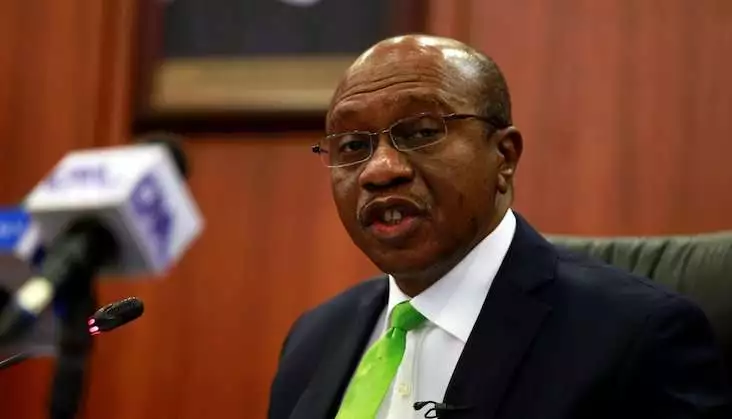As part of the naira redesign policy, the Central Bank of Nigeria, CBN, has disclosed that N500 billion will be printed and circulated in the economy.
Godwin Emefiele the CBN Governor made this known when he met with members by house of Representatives in Abuja on Thursday.
Represented by Aisha Ahmad, the CBN boss stated that the new notes were ordered from the Nigerian Security Printing and Minting Company Limited.
The CBN Governor also spoke on a wide range of issues such the problem of fake currency, POS operators, e-naira, agency banking etc, and the suggestion that the redesigning policy has political undertones.
He said efforts are particularly on to address the problem of fake currency, noting that the apex bank cannot disclose what is being done publicly for security reasons.
On fake currency the CBN Governor said “We are doing a lot of sensitization because we believe that sensitization can’t just be the newspapers, the television and radio. We need to go into the rural areas, and the markets and use people in the communities to actually drive home the message. It takes time but over time it improves.”
On the payment system he said, “we have a very robust payment system that includes bank branches, branches of micro-finance banks, POS machines, ATM machines, agent banking, E-Naira and many other options. To be specific, between the bank and the micro-finance banks, we have 6,500 locations, 900,000 POS terminals, 14,000 ATMs across the country and 1.4 million agents nationwide and every single local government in Nigeria has an agent represented. We also have a proliferation of electronic transactions. Just by way of a quick example, in 2012, we had N48 billion in POS transactions. Today, we have N6 trillion in POS transactions.
“On electronic transfers, we had N3 trillion in 2012. Today, we have 300 trillion as of October 2022. That’s a 7,000 per cent increase. We have also seen an improvement in financial inclusion to 54.1 per cent and lastly, perhaps, more importantly, we have seen the evolution of the Nigerian payment system on the global stage. Nigeria is judged 6th in the world for instant real payment and we are only behind countries like India, China, Thailand, Brazil and South Korea. We are the only African country in the top 10 and this has been a result of some of the initiatives that have gone on. Also, electronic payments and real-time data payments have been estimated to contribute about 0.67 per cent to our GDP.
“Going to the cash withdrawal limit that was issued in response to the feedback from Nigerians in response to the comments made by this revered chamber, we took those feedback on board. CBN mentioned that we will be flexible in the implementation of this policy in response to the stakeholders’ sentiments. We have since reviewed the limit significantly from N100,000 that we had per week to N500,000 per week for individuals; from N500,000 per week for corporate to N5 million per week for corporate. We have also amended the processing from 5 and 10 per cent downward to 3 and 5 per cent.
“We have clarified the strategic importance of agents as important participants in the financial system because they play a key role in certain underserved segments in the rural areas and in certain market areas and they as well would be covered by this newly revised rule.
“Just to roundup, I thought it was important Mr Speaker, to give some justifications as to why these limits are required now and why it is time for us to get cashless nationwide.
“The data available to us shows that 94 per cent of all cash transactions fall below the N500,000 limit and this includes areas in the country that are not part of the cashless policy. 82 per cent of corporate transactions also are below this limit.
“What does this mean? It means that 94 per cent of all individual transactions will not be affected by this fee that we have talked about.
“I have seen some misconceptions about the fees that we are charging the fees on the entire amount that wants to be withdrawn. No. The fees are to be charged on any withdrawal above the limit. For example, if you are withdrawing N550,000, the fee will be on the N50,000.
*We also looked at transactions for agents. So, for transactions by Nigerians that go to the agent’s location and transactions by the agents themselves, the average cash transaction of agents is N2,184,000 which is clearly within the current limit.
“The average transaction per individual that walks up to an agent is about N18,000. What the policy is trying to do is to encourage more people to come into the formal payment system because of the numerous benefits that accrue.
“It means opening up our rural areas, the underserved areas to economic opportunity, to payment opportunities and connecting them to the formal system.”
“During the COVID-19 period, we saw the negative impact of physical cash. No one could go anywhere. We couldn’t go to the banks. People couldn’t leave their homes. It was the electronic banking system that protected and served those below the poverty lines that had their
Discover more from The Source
Subscribe to get the latest posts sent to your email.








